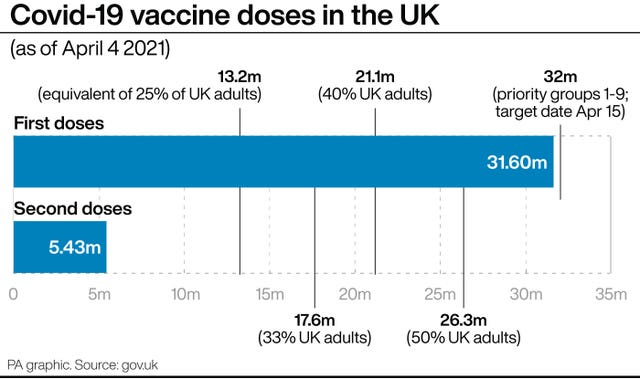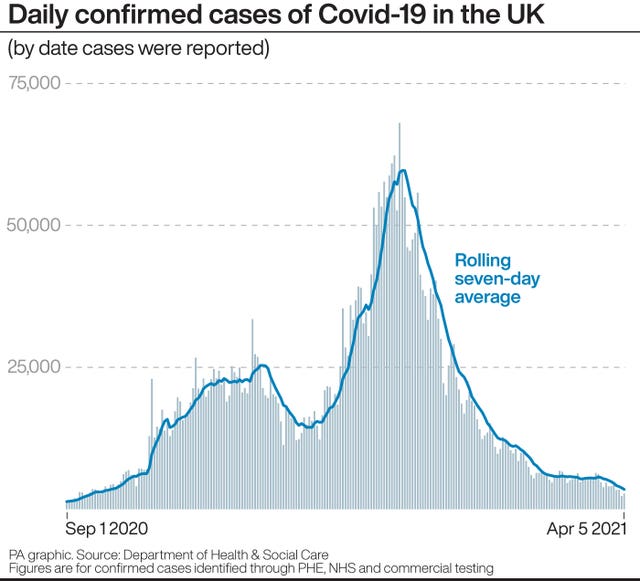PM warns against complacency as England prepares for next step out of lockdown
Boris Johnson said ‘waves of sickness’ were still hitting other countries.

Shops, hairdressers and pub beer gardens will reopen from April 12 in England but people must not be complacent about the risks still posed by coronavirus, Boris Johnson said.
Confirming the next step on the road map out of lockdown, the Prime Minister told a Downing Street press conference he was looking forward to a pint of beer in a week’s time.
But he said the difficulties facing countries in Europe illustrated the risks still posed by the pandemic.
Mr Johnson said: “We can’t be complacent. We can see the waves of sickness affecting other countries and we have seen how this story goes.
“We still don’t know how strong the vaccine shield will be when cases begin to rise, as I’m afraid that they will, and that’s why we are saying please get your vaccine – or your second dose – when your turn comes.”
He also encouraged people to use free NHS tests as part of the drive to identify cases without symptoms.
His comments come as the Medicines and Healthcare products Regulatory Agency (MHRA) said no decision on regulatory action had been taken in relation to reports of rare blood clots following being vaccinated with the AstraZeneca jab.
Channel 4 News reported that the MHRA was considering proposals to restrict the use of the Oxford-AstraZeneca vaccine in younger people and a decision could be made as early as Tuesday.
MHRA chief executive Dr June Raine said: “People should continue to get their vaccine when invited to do so.
“Our thorough and detailed review is ongoing into reports of very rare and specific types of blood clots with low platelets following the Covid-19 Vaccine AstraZeneca.
“No decision has yet been made on any regulatory action.”
Setting out the move to the second step of the road map, Mr Johnson said the shift was “fully justified by the data”.
“And on Monday the 12th I will be going to the pub myself – and cautiously but irreversibly raising a pint of beer to my lips.”
Premises allowed to reopen on April 12 include non-essential shops, hairdressers and nail salons, gyms – for people going on their own or with their household, libraries, community centres, zoos, theme parks and drive-in cinemas.
Self-contained accommodation including campsites and holiday lets will also be allowed to receive guests.
Bars and restaurants will be allowed to serve customers outdoors, but groups will be limited to two households or by the “rule of six”.
Mr Johnson’s comments came as the Government published the latest findings from its reviews of Covid status certification – so-called “vaccine passports” – and international travel.
The review suggested a certification scheme could have an “important role to play both domestically and internationally, as a temporary measure” – but Mr Johnson faces opposition from MPs on both sides of the Commons who are concerned about the civil liberties implications.
A certificate could cover whether someone had received a vaccine, had a negative coronavirus test or had contracted and recovered from Covid-19 within the past six months.
The global travel taskforce review warned “the state of the pandemic abroad, and the progress of vaccination programmes in other countries” meant it was impossible to say yet whether foreign holidays would be allowed from May 17, the date earmarked as the earliest possible for the resumption of international trips.

It confirmed the Government is examining a traffic-light system for countries, with travel to green list nations requiring no quarantine on return to the UK – although tests will still be required – although it is too early to say which destinations will be in that category.
The latest figures showed:
– Up to April 4, 31,581,623 people have had a first dose of vaccine, including 5,432,126 who have also received a second jab.
– A further 26 people had died within 28 days of testing positive for Covid-19 as of Monday, bringing the UK total by that measure to 126,862.
– As of 9am on Monday, there had been a further 2,762 lab-confirmed cases in the UK.

The expected introduction of Covid status certification faces opposition from MPs ranging from ex-Labour leader Jeremy Corbyn to the chairman of the powerful Tory backbench 1922 Committee Sir Graham Brady.
More than 70 MPs, including 40 Conservatives, have signed a pledge to oppose the “divisive and discriminatory use of Covid status certification”, suggesting the move could face defeat in the Commons.
Mr Johnson acknowledged there were “complicated ethical and practical issues”, particularly if the certificates were confined only to cover vaccines, which is why ministers were also considering test results and evidence of having natural antibodies.
On the subject of a potentially difficult Commons vote, Mr Johnson said that was “taking too many fences at once”.
“First of all we need to work out exactly what the proposal might be, but certainly if there is something to put to Parliament I have no doubt that we will be doing that,” he said.
But he stressed that a domestic certification scheme would not be introduced before either the April 12 easing of lockdown or the planned measures for May 17 which would see pubs and restaurants serving customers indoors.
The review confirmed that public transport and essential shops and services would never require Covid status certification, but it could play a role in allowing people to return to theatres, nightclubs, and mass events such as festivals or sports fixtures.
It is also possible that requiring customers to prove their status could “play a role in reducing social distancing requirements in other settings which people tend to visit more frequently” such as pubs or restaurants.
The next step along England’s route out of lockdown is scheduled for May 17 and Mr Johnson said “things still seem set fair” for that date.
But England’s chief medical officer Professor Chris Whitty warned “this virus will be with us for the foreseeable future” while chief scientific adviser Sir Patrick Vallance suggested the pandemic could result in long-term changes in behaviour.
“On social distancing, I think one has to understand what that might mean longer term,” he told a Downing Street press conference.
“And it probably means things like hand hygiene and the fact people will take time off if they get ill and stay at home rather than going into work, testing to know if you’ve got it or not.
“Those sorts of things are likely to be important baseline measures going forward.”
Tory former chief whip Mark Harper, leader of the Covid Recovery Group of lockdown-sceptics, said Parliament should be given a vote on “vaccine passports”, warning they would lead to a “two-tier Britain”.
The Confederation of British Industry said firms would need help to navigate “ethical, legal and practical implementation challenges” around status certificates.





